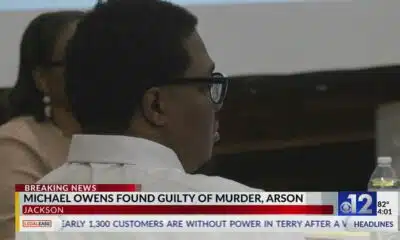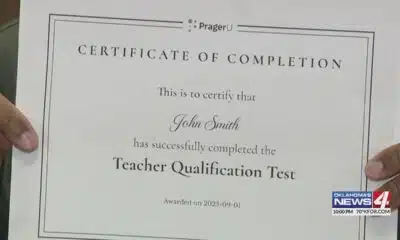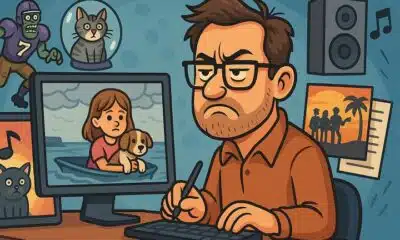News from the South - West Virginia News Feed
Jay's Evening Weather for Tuesday 05/27/25
SUMMARY: Jay’s Evening Weather for Tuesday 05/27/25 reports wet roads along I-64 and I-77 during nighttime hours, advising caution for evening travelers. Temperatures are cool, ranging from upper 40s to upper 50s across the region, influenced by cool air from eastern Canadian prairie provinces. Strong thunderstorms are affecting parts of Georgia, potentially reaching northern West Virginia overnight. The weather pattern with showers continues into Wednesday, easing slightly Thursday with less storm activity. Friday sees rain returns before drying out over the weekend with scattered showers. Flooding is unlikely due to dry ground. Temperatures rise into the upper 70s and lower 80s by next Tuesday.
It’s a cool and dreary evening around the region, and the wet weather is set to continue for another couple of days before drier weather takes over.
FOR ALL THE LATEST, FOLLOW US ON FACEBOOK AND TWITTER:
https://facebook.com/WOAYNewsWatch
https://twitter.com/WOAYNewsWatch
News from the South - West Virginia News Feed
Protesters in D.C. flood the streets demanding an end to Trump’s military deployment
by Ashley Murray, West Virginia Watch
September 8, 2025
WASHINGTON — Thousands marched in Washington, D.C., Saturday to protest President Donald Trump’s continued deployment of National Guard troops and the increased federal law enforcement on the streets of the nation’s capital.
The large demonstration, dubbed by organizers as the “We Are All DC” march, trailed down the district’s 16th Street NW toward the White House and came after several days of Trump’s heightened threats to send National Guard troops to Chicago, Boston, Baltimore, New Orleans and other Democratic-led cities.
The district’s Democratic attorney general sued the Trump administration Thursday arguing the ongoing presence of National Guard troops amounts to illegal military occupation.
Gail Hansen, 71, of Washington, D.C., joined the “We Are All DC” march Saturday, Sept. 6, 2025, in the District of Columbia. (Photo by Ashley Murray/States Newsroom)
Guard members from the District of Columbia and seven states had already been deployed in Washington as of this week when Georgia Gov. Brian Kemp announced Friday he would add 300 soldiers and 16 support staff, becoming the eighth state to send troops.
On Friday, Trump added Portland, Oregon, to the list of cities where he wants to deploy the Guard.
Demonstrators carried signs bearing the message “End the Occupation,” “Free DC” and “Get the ICE Out,” in reference to recent U.S. Immigration and Customs Enforcement arrests in the district.
Marchers walked down H Street NW in Washington, D.C., on Sept. 6, 2025 during the “We Are All DC” demonstration . (Video by Ashley Murray/States Newsroom)
Dozens of organizations participated in the march, including labor unions, faith-based organizations, immigration advocates, the League of Women Voters D.C. chapter and the D.C. Democratic Party.
Gail Hansen, 71, of Washington, D.C., said she wants to see a decreased ICE presence.
“I believe in freedom, and I think we’ve all gotta let everybody know that what’s happening on our streets is unacceptable,” Hansen told States Newsroom. “ICE needs to go home. The National Guard needs to go home. FBI needs to get out of our streets. We are doing just fine in D.C.”
Charlotte Stone, 18, of Virginia Beach, Virginia, held a cardboard sign above her head depicting a caricature of Trump with a Hitler mustache and a message that read “Ignoring it is what the Germans did.”
Charlotte Stone, 18, of Virginia Beach, Virginia, at the “We Are All DC” march Saturday, Sept. 6, 2025, in the District of Columbia. (Photo by Ashley Murray/States Newsroom)
“I’m disgusted with this country, I’m here with my friends, and we’re freshmen at George Washington University, and we’re disgusted. We need to do something about it,” Stone told States Newsroom.
The Washington Metropolitan Police Department released statistics Tuesday claiming overall crime had decreased by 8% in the district over the previous seven days.
Protesters carry Banksy-style banner depicting a man throwing a sandwich as a nod to former Justice Department employee Sean Dunn, who threw a Subway hoagie at federal agents on Aug. 10 at 14th & U St NW in Washington, D.C. The marchers were part of the “We Are All DC” demonstration on Saturday, Sept. 6, 2025. (Video by Ashley Murray/States Newsroom)
Trump’s 30-day emergency to federalize law enforcement in D.C. ends Sept. 10. On Tuesday, district Mayor Muriel Bowser announced an agreement with the administration to continue a collaboration between local police and federal law enforcement.
A protester pushes a bike carrying two dogs and bearing an American flag and District of Columbia flag at the “We Are All DC” march on Saturday, Sept. 6, 2025. (Photo by Ashley Murray/States Newsroom)
On Saturday morning, Trump posted an AI-generated image of himself with a burning Chicago skyline behind him and a message referring to the 1979 Vietnam War film “Apocalypse Now.”
He wrote on his platform Truth Social, “‘I love the smell of deportations in the morning…’ Chicago about to find out why it’s called the Department of WAR,” in reference to his unofficial renaming of the Department of Defense on Friday.
West Virginia Watch is part of States Newsroom, a nonprofit news network supported by grants and a coalition of donors as a 501c(3) public charity. West Virginia Watch maintains editorial independence. Contact Editor Leann Ray for questions: info@westvirginiawatch.com.
The post Protesters in D.C. flood the streets demanding an end to Trump’s military deployment appeared first on westvirginiawatch.com
Note: The following A.I. based commentary is not part of the original article, reproduced above, but is offered in the hopes that it will promote greater media literacy and critical thinking, by making any potential bias more visible to the reader –Staff Editor.
Political Bias Rating: Left-Leaning
This content primarily highlights protests against former President Donald Trump’s policies, particularly focusing on opposition to the deployment of National Guard troops and federal law enforcement in Democratic-led cities. It features voices critical of Trump and his administration, including references to legal challenges and activist groups aligned with progressive causes. The framing and selection of quotes suggest a perspective sympathetic to the protesters and critical of Trump’s actions, indicating a left-leaning bias.
News from the South - West Virginia News Feed
WEEKEND WEATHER SEPT 7TH
SUMMARY: WEEKEND WEATHER SEPT 7TH: After a rainy day yesterday, Appalachia is now clear with only a few fair weather clouds. Temperatures are in the low to mid-60s due to a recent cold front, bringing lower humidity around 40-50%. Patchy fog may develop late tonight, especially near rivers, with chilly mornings in the 40s and possibly high 30s by Tuesday. Tomorrow’s highs will reach the upper 60s to low 70s with plenty of sunshine, perfect for outdoor activities. The week ahead remains dry and comfortable, with no rain expected and humidity staying low. Temperatures will normalize by week’s end.
FOLLOW US ON FACEBOOK AND TWITTER:
https://facebook.com/WOAYNewsWatch
https://twitter.com/WOAYNewsWatch
News from the South - West Virginia News Feed
National Grandparents Day (9-7-25) and the special bond shared with their grandchildren
SUMMARY: This Sunday, September 7th, is National Grandparents Day, honoring the special bond between grandparents and grandchildren. In Milton State, many grandparents become primary caregivers due to their children’s substance abuse disorders. Presley Ridge highlights the vital role grandparents play in foster care, offering training and support to become certified foster parents. West Virginia leads the nation in child removals, resulting in many grandparents raising grandchildren full-time. Services aim to reunify families by supporting parents’ recovery. Children thrive better in familiar grandparent homes, providing love and stability. Senator Brian Hilton emphasizes improving treatment programs to help families heal and support grandparents effectively.
National Grandparents Day is a time to appreciate the joy and wisdom they bring to our lives. Mountain State grandparents often take on another role, stepping in to become primary caregivers when their children have substance abuse issues.
~ Newswatch reporter Jillian Risberg (https://www.facebook.com/JillianRisTV) found out how much love, guidance, and stability grandparents can provide.
FOLLOW US ON FACEBOOK AND TWITTER:
https://facebook.com/WOAYNewsWatch
https://twitter.com/WOAYNewsWatch
-
Mississippi Today6 days ago
Trump proposed getting rid of FEMA, but his review council seems focused on reforming the agency
-
News from the South - Tennessee News Feed7 days ago
Tennessee ranks near the top for ICE arrests
-
News from the South - Texas News Feed4 days ago
Texas high school football scores for Thursday, Sept. 4
-
Mississippi Today6 days ago
Brandon residents want answers, guarantees about data center
-
News from the South - Oklahoma News Feed7 days ago
Test taker finds it's impossible to fail 'woke' teacher assessment
-
The Conversation7 days ago
What is AI slop? A technologist explains this new and largely unwelcome form of online content
-
News from the South - Arkansas News Feed7 days ago
Every fall there’s a government shutdown warning. This time it could happen.
-
Our Mississippi Home7 days ago
Pre-Fall Fun in Mississippi | Our Mississippi Home











































